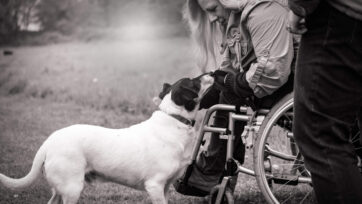
OUR DOGS DON’T LIVE LONG ENOUGH
NEW RESEARCH IS SET TO FIND OUT WHY
Every year we discover more about how we as humans benefit from our best friend the dog. Many if not most of the dog owners would do just about anything to extend the lifespan of our loving friend. Well, a group of researchers set out to see if this is indeed possible by examining two super senior dogs’ genome sequences.
David Jonas, chief researcher at the Department of Ethology at Eotvos Lorand University in Budapest, Hungary said “aging is known to be influenced by both genetic and environmental factors” as he This Dog’s Life in an email. It should be known that the genetic factors contributing to aging are of special interest when compared to the environmental factors ( e.g. nutrition, healthcare, or physical activity ), since the former ones cannot be changed as quickly and efficiently as the latter.
The team analyzed the DNA sequences of a 22-year-old and a 27-year-old dog. What they found was that the dogs had mutations that were not present in the average aged dogs. The specific genes associated with extreme longevity were linked to regulation of cell death, regulation of blood pressure, and development of the nervous system.
OTHER FACTORS FOUND IN THE LONGEVITY OF DOGS
Each of these is respectively related to delaying age-related diseases, the research article mentioned: “sensory changes ( e.g., hearing loss ), systemic (e.g., high blood pressure ) and neurodegenerative disorders ( e.g., Alzheimer’s disease ).”
The study also suggests this information on genes could prompt breeders to favor longevity instead of looks among breeds … but it is very complicated.
What this would mean is a positive change in the selected trait ( in a healthy lifespan ), but it will be inevitable.
If there is a change in the other linked characteristics, that could mean that change might easily be a negative one in those linked traits,” Jonas said, explaining that selecting for one complex trait affects hundreds – potentially thousands – of genes simultaneously.
OLD DOG SIMILARITIES
Forgetting about genes, the two senior dogs shared other similarities: both were mixed – breeds lived in rural areas of Hungary, ate wild prey, and had plenty of human contact throughout their lives.
Co-author of the study’s manuscript, Sara Sandor, confirmed these factors did, in fact contribute to the dog’s long lifespans.
MORE FINDINGS
“All these factors have been reported to impact aging in several model organisms and in humans, ” Sandor said. “It is likely that their daily exercise level was higher, while their calorie intake was lower than in the case of an aging and slower cognitive decline in humans.”
Sandor added that autophagy, the main cellular mechanism responsible for these effects, “was shown to play tumor – suppressor and brain-protective roles in many cases.” A different study where laboratory dogs were fed a low-calorie diet indicated that caloric restriction slows down the aging process and protects nerve cells against damage.
Practices you implement as a dog owner can help your best friend live a long, healthy, and happy life, regardless of genes.
Eniko Kubinyi, the principal investigator of the study’s manuscript, provided a list to This Dog’s Life that included practices such as: regularly taking your dog to the veterinarian for check-ups, feeding him/her an age-appropriate diet, spending more quality time with him/her, taking him/her for controlled walks and reducing their exposure to potentially traumatic experiences.
This study is the first of its kind in which extremely senior dogs and studied for aging and longevity. In order to perform statistical hypothesis testing and determine significance, researchers need six to eight more samples from dogs of extreme age. ( of course, these dogs are very hard to come by. )
There can be no amount of research that’s too much in the search for prolonging our dog’s life.

